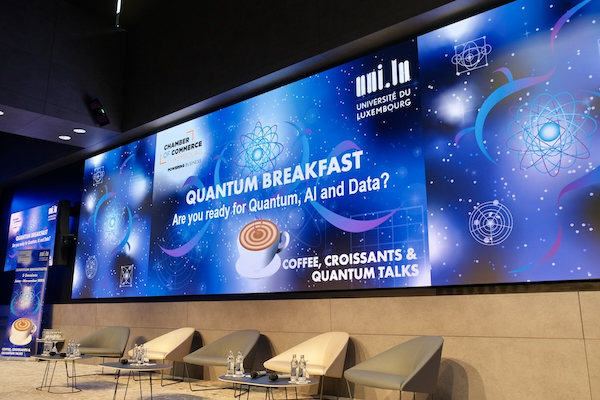 The University of Luxembourg’s “Are you ready for Quantum, AI and Data?” Quantum Breakfast seminar at the Luxembourg Chamber of Commerce in Luxembourg-Kirchberg;
Credit: Steven MIller, Chronicle.lu
The University of Luxembourg’s “Are you ready for Quantum, AI and Data?” Quantum Breakfast seminar at the Luxembourg Chamber of Commerce in Luxembourg-Kirchberg;
Credit: Steven MIller, Chronicle.lu
On Thursday 27 November 2025, the University of Luxembourg hosted the final edition of its 2025 Quantum Breakfast series at the Luxembourg Chamber of Commerce in Luxembourg-Kirchberg.
Guest speakers at the fifth edition of the technology seminar, titled “Are you ready for Quantum, AI and Data?”, included Daniel Opalka, Head of Unit for Research & Innovation at EuroHPC JU; Alexandre Tkatchenko, Professor of Theoretical Condensed Matter Physics at the University of Luxembourg; and Thomas Stifter, Department Manager for Basics & Mathematical Models at IEE SA (International Electronics & Engineering SA).
The event opened with a welcome speech from Max Gindt, Head of Unit for Digital Policy at the Luxembourg Ministry of State. He outlined the Luxembourg Government’s strategies relating to quantum technology, data and artificial intelligence (AI), as well as the cooperation between the Ministry of State, the Ministry of the Economy, the Ministry of Higher Education and Research and the Ministry for Digitalisation. He also referred to Luxembourg Prime Minister Luc Frieden’s recent working visit to Seattle and San Francisco (United States), aimed at strengthening technological, scientific and economic ties between Luxembourg and the US.
Daniel Opalka then presented the work of the European High Performance Computing Joint Undertaking (EuroHPC JU), the Luxembourg-based organisation responsible for delivering Europe’s digital strategy. He also spoke about the launch of AI Factories in Europe, four of which have been developed so far under the European Commission’s Digital Compass 2030 initiative. One such AI Factory will be established in Luxembourg as part of the country’s MeluXina supercomputer infrastructure. The facilities, he stressed, will soon be operational and made available free of charge for open-science research across European communities.
The first keynote speech was delivered by Alexandre Tkatchenko, who detailed ongoing research using quantum mechanics and AI to create molecular simulations that help scientists understand how cells function and interact, and how living matter emerges from atomic and molecular processes. He explained how this work is essential for developing new drugs and materials, though challenges remain in ensuring both efficiency and accuracy. He highlighted the need for larger and more powerful computational systems - such as the MeluXina supercomputer - which already supports many of these simulations.
Alexandre Tkatchenko illustrated progress in the field by comparing a 2011 simulation involving structural protein studies: when performed with explicit quantum mechanics, it required over one year using 1,000 CPUs (central processing units). Today, thanks to AI and technological advances, the same simulation can be completed in approximately five minutes on a single GPU (graphics processing unit).
The second keynote was presented by Thomas Stifter, who outlined IEE’s development of sensor technologies for the automotive sector and smart-health applications. He described the challenges of collecting and integrating relevant data and training machine-learning systems to ensure reliable results. Among the technologies he discussed were systems for presence detection and hands-off detection during driving, seat-occupancy sensing in vehicle interiors, and a system designed to detect whether a baby has been left inside a car - an innovation that could prevent dangerous situations in high-temperature conditions.
Following a short break, the event continued with a round-table discussion moderated by presenter Lisa Burke. Contributions came from all four speakers:
- Daniel Opalka provided further insights into EuroHPC JU’s activities;
- Max Gindt discussed the costs, applications and future development of MeluXina and Luxembourg’s AI Factories;
- Alexandre Tkatchenko stressed the importance of investing in talent to strengthen Europe’s scientific expertise, noting that while European research is of high quality, it often lacks corresponding industrial and economic development;
- Thomas Stifter elaborated on the data requirements that guide sensor and AI system development and the importance of funding.
The event concluded with a question-and-answer session with the audience.
















